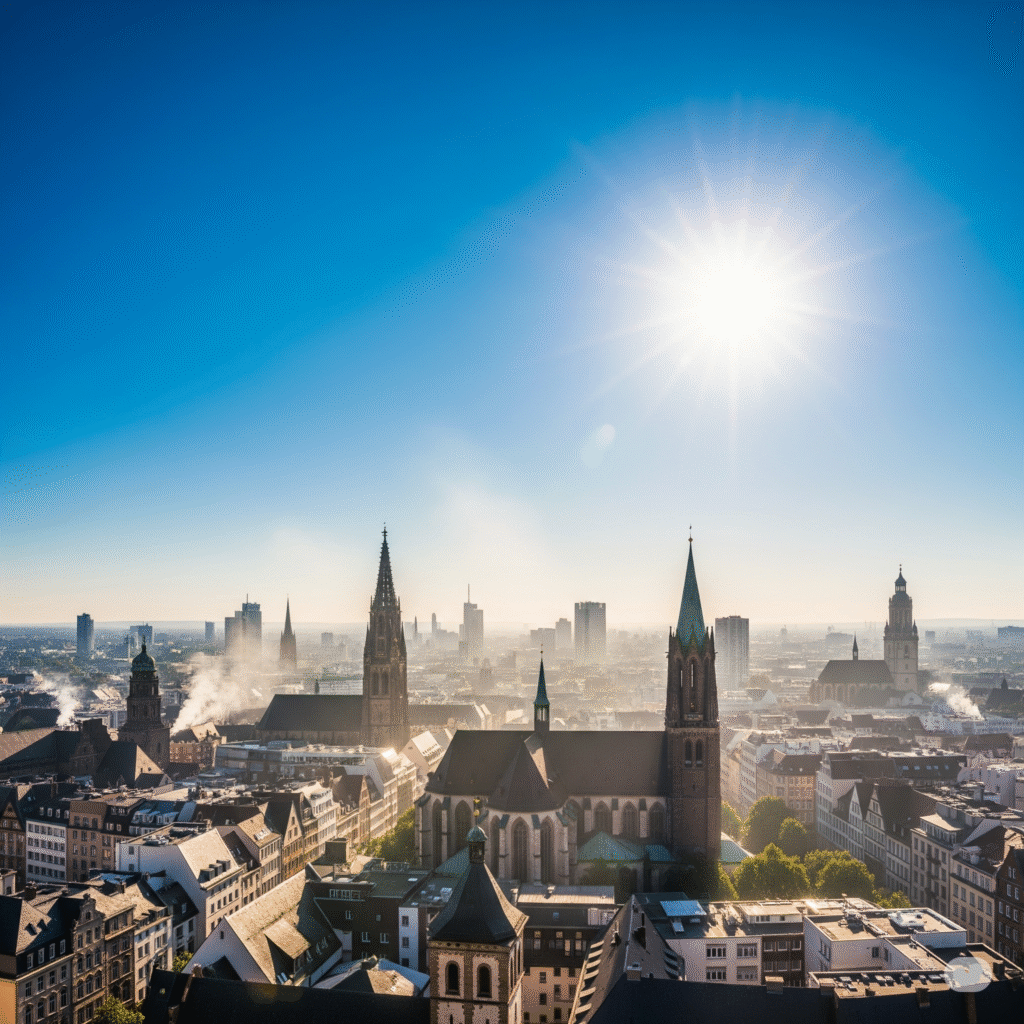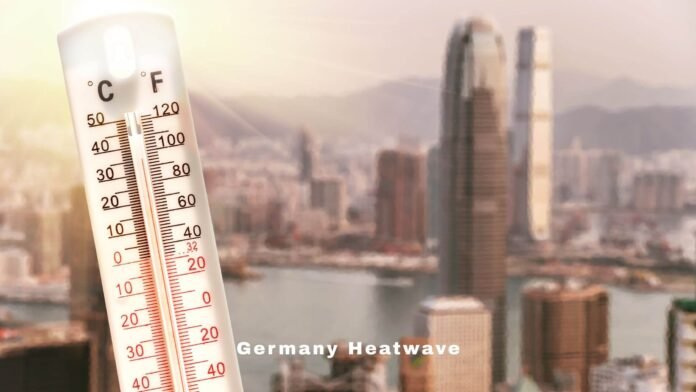
Deutschlands Rekordhitze – Warum Expats jetzt handeln müssen
Deutschland leidet unter einer historischen Hitzewelle diesen Juli. Mit Temperaturen bis zu 39°C in Berlin und anderen Großstädten erlebt das Land eine seiner heißesten Sommer Die anhaltende Hitzewelle in Deutschland hat das Sicherheitsbewusstsein wichtiger denn je gemacht.
Der Zugverkehr ist langsamer, Krankenhäuser verzeichnen einen Anstieg hitzebedingter Erkrankungen, und die Stromnetze vielerorts sind überlastet. Viele Menschen, insbesondere Neuankömmlinge oder Menschen aus kühleren Regionen, könnten von dieser extremen Hitze überrascht und potenziell schädlich sein.
Auch wenn die Einheimischen eher an die Hitze gewöhnt sind, leben viele Expats in Häusern ohne Klimaanlage, arbeiten in Büros ohne gute Belüftung und wissen möglicherweise nichts über wichtige Hitzewarnungen und Sicherheitsdienste in ihrer Gegend.
Aus diesem Grund gibt es diesen Leitfaden.
Dieser Leitfaden bietet wichtige Tipps und einfache Ratschläge, damit Sie in den heißen Sommermonaten sicher, hydriert und gesund bleiben. Wir erklären die Anzeichen von Hitzeerschöpfung und zeigen Ihnen einfache Möglichkeiten, Ihr Zuhause ohne Klimaanlage kühl zu halten. Alles, was Sie wissen müssen, um die Hitzewelle souverän zu meistern, erfahren Sie hier!
Als Deutschland Die Hitzewelle hält an. Für alle Einwohner ist es wichtig, über die örtlichen Bedingungen informiert zu bleiben.
Historische Hitzewelle in Deutschland
— Extreme Temperaturen auf der ganzen Welt (@extremetemps) 2. Juli 2025
Dutzende Stationen erlebten eine tropische Nacht und in Essen sogar ein außergewöhnliches Minimum von 25,0 °C, die heißeste Nacht aller Zeiten in einem Monat.
Auch auf dem höchsten Berg der Niederlande liegen die Tiefsttemperaturen bei fast 25 °C.
39 °C später erwartet: Updates in wenigen Stunden pic.twitter.com/rX9f74BGiV
Wo die Hitze am härtesten zuschlägt: Wichtige Regionen und ihre Probleme
Regionale Aufschlüsselung: Temperaturspitzen und Hitzewellen-Hotspots
In diesem Juli ist die Hitzewelle in Deutschland in den zentralen und südlichen Regionen am stärksten zu spüren, wobei die städtischen Zentren die Hauptlast der steigenden Temperaturen tragen.
- Berlin hat Höchstwerte von 39°C, wodurch die Kapazität der Notdienste voll ausgelastet ist.
- Frankfurt erreichte eine Temperatur von 40°C, was dazu führt weitverbreitete Warnungen der örtlichen Behörden.
- München Temperaturen erreichten 38°C, mit minimaler Linderung über Nacht.

Auch ländliche Regionen spüren die Hitze, aber Städte sind besonders gefährdet. Die städtischer Wärmeinseleffekt, wo Beton, Asphalt und dichte Gebäude die Wärme einschließen, können die Temperaturen in der Innenstadt auf bis zu 5°C höher als in den umliegenden Gebieten. Das bedeutet, dass es in ländlichen Dörfern nachts zwar etwas kühler sein kann, in dicht besiedelten Stadtgebieten jedoch nach Sonnenuntergang oft noch stickig bleibt.
Nach nur kurzer Atempause kündigt sich in ganz Deutschland bereits die nächste Hitzewelle an. Am Mittwoch, dem 2. Juli 2025, verzeichneten die Wetterdienste örtlich Höchstwerte von über 39 °C – der heißeste Tag des Jahres bisher. Mit dem Ende der ersten Hitzewelle brachte eine… pic.twitter.com/pLpFS3LwhK
— Meteoleitstelle (@meteoleitstelle) 2. Juli 2025
Auswirkungen auf das tägliche Leben: Schulen, Krankenhäuser und Arbeiter im Freien unter Druck
Die Hitzewelle stellt die öffentliche Infrastruktur und den Alltag im ganzen Land auf die Probe.
- Schulen: In Bayern, über 200 Schulen haben verkürzte Stunden oder ganz geschlossen, da die Belüftung unzureichend sei und Sicherheitsbedenken für die Schüler bestünden. Ähnliche Maßnahmen werden in Nordrhein-Westfalen und Hessen erwogen.
- Krankenhäuser: Notaufnahmen in Städten wie Frankfurt und Stuttgart melden eine 30% Anstieg der Einweisungen wegen Hitzschlag im Vergleich zu Anfang Juni. Besonders gefährdet sind gefährdete Bevölkerungsgruppen, insbesondere ältere Menschen und kleine Kinder.
- Arbeiter im Freien: Bei Mittagstemperaturen regelmäßig über 35°Csind neue Sicherheitsvorschriften in Kraft getreten. In Berlin und Hamburg Bautrupps müssen jede Stunde Pausen machen, während Lieferunternehmen ihre Schichten an kühlere Morgen- und Abendfenster anpassen.
Der Hitze trotzen: Praktische Kühltipps für Expats
Tipps zur Kühlung zu Hause: Schaffen Sie Ihre eigene „Klima-Oase“
Die meisten deutschen Häuser und Wohnungen sind nicht für diese Hitze ausgelegt. Doch mit ein paar kleinen Veränderungen lässt sich der Wohnraum auch bei Außentemperaturen um die 40 Grad Celsius erträglich halten.
- Blockieren Sie die Sonne. Schließen Sie Jalousien oder Vorhänge am Vormittag. Verdunkelungsvorhänge eignen sich am besten. Aluminiumjalousien oder reflektierende Fensterfolien können die Erwärmung im Innenbereich reduzieren.
- Verwenden Sie den Luftstrom mit Bedacht. Betreiben Sie Ventilatoren mit einem feuchtes Handtuch darüber gelegt um einen kühlenden Nebel zu erzeugen. Stellen Sie Ventilatoren so auf, dass kühlere Nachtluft ins Innere gelangt.
- Lüften Sie zum richtigen Zeitpunkt. Öffnen Sie die Fenster spät abends oder früh morgens, wenn die Außenluft kühler ist.
- Schaffen Sie eine kühle Zone. Wählen Sie einen Raum aus, den Sie in einen „Klimaoase“. Sorgen Sie für Dunkelheit und Ordnung und trennen Sie unnötige elektronische Geräte, die Wärme erzeugen, vom Stromnetz.
Auch ohne Klimaanlage können diese kleinen Tricks einen spürbaren Unterschied machen.
Überleben am Arbeitsplatz: So bleiben Sie produktiv und cool

Nicht alle Büros in Deutschland sind klimatisiert, und während einer Hitzewelle ist das ein echtes Problem. So passen Sie sich an:
- Kleiden Sie sich elegant. Bleiben Sie bei lockere, atmungsaktive Stoffe wie Baumwolle oder Leinen. Vermeiden Sie synthetische Materialien, die Wärme speichern.
- Bleiben Sie flexibel. Wenn es Ihr Job erlaubt, fragen Sie nach Angepasste Arbeitszeiten; viele Unternehmen erlauben mittlerweile Frühschichten, um Hitzespitzen zu vermeiden.
- Bringen Sie Ihr eigenes Cooles mit. A USB-betriebener Tischventilator, ein kühlendes Handtuch oder sogar eine in ein Tuch gewickelte gefrorene Wasserflasche können in stickigen Arbeitsräumen Linderung verschaffen.
Kleine Veränderungen können Ihre Produktivität und Ihr Wohlbefinden steigern, auch wenn der Thermostat anders reagiert.
Flüssigkeitszufuhr 101: Dehydration bei extremer Hitze vermeiden
Eine der größten Gefahren einer Hitzewelle ist nicht genug trinken, insbesondere wenn Sie extremes Wetter nicht gewohnt sind.
- Halten Sie sich an einen Zeitplan. Ziel für 2 bis 3 Liter Wasser pro Tag, auch wenn Sie keinen Durst haben. Richten Sie bei Bedarf Erinnerungen auf Ihrem Telefon ein.
- Iss dein Wasser. Fügen Sie Snacks hinzu wie Wassermelone, Gurke oder Erdbeeren zu Ihrem Alltag.
- Füllen Sie verlorene Mineralien wieder auf. An besonders heißen Tagen gehören Elektrolytgetränke oder leicht gesalzene Snacks, um den Verlust durch Schwitzen auszugleichen.
Dehydration kann schnell auftreten. Um sicher zu bleiben, ist es wichtig, ihr zuvorzukommen.
Unterstützungssysteme: Gesetze, Arbeitgeberpflichten und öffentliche Kühlzentren
Wärmeverordnung in Deutschland: Was gilt?
In Deutschland gelten bei extremer Hitze Arbeitsschutzstandards. Die nationalen Arbeitsschutzrichtlinien:
- Wenn Innentemperaturen über 26°Cmüssen Arbeitgeber die Risiken bewerten und Kühlmaßnahmen in Betracht ziehen.
- Bei über 30°C, werden zusätzliche Maßnahmen notwendig, wie etwa die Bereitstellung von Ventilatoren oder die Ermöglichung flexibler Schichten.
- Sobald die Temperaturen über 35°C im Innenbereichgilt der Raum offiziell als „ungeeignet für eine reguläre Arbeit.“
Diese Vorschriften dienen dem Schutz der Arbeitnehmer, unabhängig von ihrer Nationalität oder Vertragsart.
Pflichten des Arbeitgebers: Was Sie erwarten (und verlangen) können
Ihr Arbeitgeber hat eine gesetzliche Pflicht, für Ihre Sicherheit zu sorgen bei extremer Hitze. Dazu gehören:
- Bereitstellung von Trinkwasser und fördert eine regelmäßige Flüssigkeitszufuhr.
- Anpassung der Arbeitszeiten zu kühleren Tageszeiten.
- Häufigere Pausen ermöglichen, insbesondere für körperlich anstrengende Rollen.
Wenn Sie zu einer Hochrisikogruppe gehören (z. B. schwanger sind oder an einer Krankheit leiden), sind möglicherweise zusätzliche Vorkehrungen erforderlich.
Tipp: Wenn es in Ihrem Büro schwül heiß ist und keine Änderungen vorgenommen wurden, sollten Sie dies mit Die Personalabteilung oder Ihr Vorgesetzter. Hitzeschutz ist keine Option, sondern Ihr Recht.
Öffentliche Kühlzentren: Finden Sie Hilfe in Ihrer Nähe
Viele deutsche Städte öffnen öffentliche Kühlzentren um den Bewohnern, insbesondere denen ohne Klimaanlage, Erleichterung zu verschaffen.
- Berlin derzeit tätig 15 öffentliche Kühlräume, darunter Bibliotheken, Kirchen, Seniorenzentren und Sporthallen.
- Andere Städte wie Hamburg, Köln und Stuttgart ziehen nach.
Lokale Websites oder kommunale Apps (wie „Berlin.de“ oder „Mein München“) sind Ihre beste Quelle für aktuelle Listen und Öffnungszeiten.
Diese Räume bieten mehr als nur eine Klimaanlage; sie umfassen oft frei Wasser, Sitzgelegenheiten und Zugang zu öffentlichen ToilettenIn manchen Fällen sind Sozialarbeiter vor Ort, um gefährdeten Personen zu helfen.
Mehr als 39 Grad
— Alles Gute 💚 (@AndreaKhle4755) 3. Juli 2025
Bisher heißester Tag des Jahres
Stand: 02.07.2025 22:02 Uhr
Im Westen Deutschlands endete der bisher heißeste Tag des Jahres mit zum Teil schweren Unwettern. In Südeuropa, wo die Temperaturen noch höher waren, starben mehrere Menschen infolge der Hitze.
☠️🥵 pic.twitter.com/M8iGokbkk8
Bleiben Sie vorbereitet: Wichtige Tipps und Dinge für Expats
Hitzschlag vorbeugen: Erkennen und reagieren
Ein Hitzschlag kann sich schnell verschlimmern und ist oft vermeidbar, wenn man die Warnzeichen kennt.
Achten Sie auf:
- Schwindel oder Benommenheit
- Kopfschmerzen
- Übelkeit oder Erbrechen
- Schneller Puls
- Verwirrung oder Desorientierung
- Heiße, trockene Haut (fehlendes Schwitzen ist ein Warnsignal)
Was zu tun:
- Wechseln Sie zu einem schattiger oder klimatisierter Bereich sofort.
- Schluck kühles Wasser langsam.
- Anwenden feuchte Tücher an Hals, Handgelenken und Stirn.
- Entfernen Sie überschüssige Kleidung.
- Wenn sich die Symptome verschlimmern, Rufen Sie 112 an, die Notrufnummer Deutschlands.
Eine frühzeitige Reaktion kann Leben retten.
Outdoor-Aktivitäten planen: Timing ist alles
Sie müssen nicht den ganzen Tag drinnen bleiben, aber Timing und Tempo sind entscheidend.
- Versuchen Sie, Besorgungen, Spaziergänge oder Trainingseinheiten zu erledigen vor 10 Uhr oder nach 18 UhrDadurch wird die maximale Intensität der Sonne vermieden.
- Bleiben Sie bei schattige Bereiche, wie etwa Parks mit Baumbestand oder Stadtstraßen mit Überhängen.
- Vermeiden Sie intensive körperliche Aktivitäten im Freien. Heben Sie sich Joggen oder schweres Heben für kühlere Tage auf.
Bei extremem Wetter ist ein wenig Planung sehr hilfreich.
Clever packen: Must-haves für die Hitze

Gehen Sie nach draußen? Bewahren Sie diese wichtigen Dinge in Ihrer Tasche oder Ihrem Rucksack auf:
Sonnenschutz (LSF 30 oder höher)
Wiederverwendbare Wasserflasche – nachfüllen, wann immer möglich
Kühlende Handtücher oder Tücher – Nachnässen für unterwegs
Breitkrempiger Hut oder Mütze – Gesicht und Hals schützen
Tragbarer Ventilator – USB- oder batteriebetriebene Optionen verfügbar
Optional, aber nützlich: ein kleiner Regenschirm für sofortigen Schatten und Sonnenbrillen mit UV-Schutz.
Jeder Punkt auf dieser Liste trägt dazu bei, das Risiko eines Hitzestresses zu verringern und sorgt dafür, dass Sie sich den ganzen Tag über wohler fühlen.
Bleiben Sie informiert, bleiben Sie cool
Deutschland erlebt einen der intensivsten Sommer seit Beginn der Wetteraufzeichnungen. Bei der Sicherheit während dieser Hitzewelle geht es nicht nur um Komfort; es geht auch um Gesundheit, Vorbereitung und Gemeinschaft.
Folgendes sollten Sie sich merken:
- Verstehen Sie das Risiko. Extreme Hitze wirkt sich auf Städte und Einzelpersonen unterschiedlich aus. Machen Sie sich bewusst, welche Auswirkungen sie auf Ihr Zuhause, Ihre Arbeit und Ihre Gesundheit haben kann.
- Cool, schlau. Nutzen Sie Kühlstrategien für zu Hause, trinken Sie ausreichend und passen Sie Ihren Tagesablauf an.
- Kennen Sie Ihre Rechte. Arbeitgeber müssen für sichere Bedingungen sorgen. Öffentliche Kühlzentren stehen allen offen.
- Seien Sie vorbereitet. Lernen Sie, die Symptome eines Hitzschlags zu erkennen und halten Sie Ihr persönliches Überlebenskit bereit.
Du bist nicht allein. Geben Sie diesen Leitfaden an andere Auswanderer, Nachbarn oder Kollegen weiter, insbesondere an diejenigen, für die der deutsche Sommer vielleicht noch nicht so bekannt ist.
Bleiben Sie auf dem Laufenden durch die Überprüfung offizieller Kanäle wie Deutscher Wetterdienst (DWD) für lokale Warnungen und Prognosen. Expats können sich auch an Foren wenden wie Spielzeugstadt Deutschland oder Facebook-Gruppen für Community-Support und Tipps in Echtzeit.
Ein Wettermodell schlägt Alarm: Ab dem 10. Juli droht Deutschland eine extreme Hitzewelle mit gefährlichen Auswirkungen für Mensch und Natur. Modell rechnet mit brutaler Hitzewelle – über 40°C https://t.co/1SZhONlu01
— Martin E. Achstaller (@MAchstaller) 6. Juli 2025
FAQ: Hitzewelle in Deutschland im Juli 2025
F: Sind deutsche Wohnungen normalerweise klimatisiert?
A: Nein. Die meisten deutschen Häuser und Wohnungen sind nicht mit einer Klimaanlage ausgestattet. Ventilatoren, Verdunkelungsvorhänge und eine intelligente Lüftung sind die besten Hilfsmittel.
F: Was soll ich tun, wenn mir draußen schwindelig wird?
A: Suchen Sie sofort einen schattigen Bereich oder ein öffentliches Gebäude auf. Trinken Sie Wasser, lockern Sie Ihre Kleidung und kühlen Sie Ihre Haut mit einem feuchten Tuch. Wenn die Symptome anhalten oder sich verschlimmern, rufen Sie 112 für Nothilfe.
F: Kann ich von meinem Arbeitgeber kühlere Arbeitsbedingungen verlangen?
A: Ja. Das deutsche Arbeitsrecht verpflichtet Arbeitgeber, Maßnahmen zu ergreifen, sobald die Innentemperatur 26 °C übersteigt, und schreibt bei Temperaturen über 35 °C Pausen und Schutzmaßnahmen vor.
F: Wo finde ich Kühlzentren in meiner Nähe?
A: Viele Städte veröffentlichen Listen auf ihren offiziellen Websites. Berlin, aktuelle Standorte finden Sie über Berlin.de. Bibliotheken, Kirchen und Gemeindehallen dienen oft als ausgewiesene Kühlzentren.
F: Sind Haustiere von der Hitze betroffen, zu?
A: Absolut. Halten Sie Haustiere während der Stoßzeiten im Haus, stellen Sie ihnen stets frisches Wasser zur Verfügung und vermeiden Sie es, mit Hunden auf heißem Asphalt spazieren zu gehen, da dies zu Verbrennungen an den Pfoten führen kann.
F: Wie oft werden Hitzewellenwarnungen herausgegeben?
A: Der Deutscher Wetterdienst (DWD) veröffentlicht täglich Updates und Warnungen. Abonnieren Sie den Warndienst oder laden Sie die App für Echtzeitinformationen herunter.

